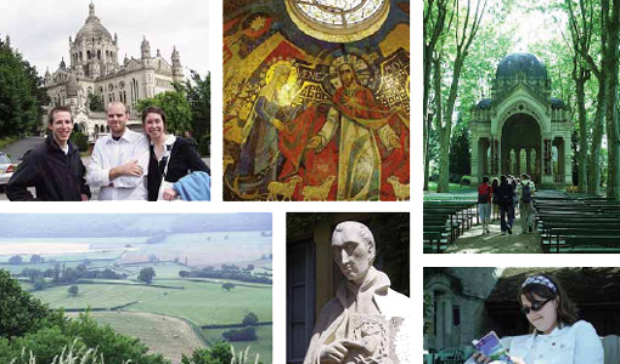Last May, when most students were either heading home for summer vacation or preparing to enter their post-graduate life, a group of 12 students, accompanied by Dr. Christopher Blum of St. Thomas More College, staff member Leah Strand and me, set out in a different direction: for the Burgundy region of France. These were the Catholic Studies Leadership Interns, and they were attending their first spring institute.
The Leadership Interns program, now in its second year, brings together a group of dedicated Catholic Studies majors or minors, and by hosting a fall retreat, regular meetings during the school year and the yearly spring institute, it attempts to impart a vision for Catholic leadership and to provide a variety of opportunities to grow in leadership skills and character. Interns are involved in many aspects of campus and Church life. They are prefects of our Catholic Studies households, leaders in student government and various Catholic and Christian groups on campus, resident assistants in dormitories, captains of sports teams, officers in the Knights of Columbus, and more.
Whether they are studying for a particular career or discerning the priesthood, what unites these men and women in warm friendship and common action is a set of convictions. They understand that young Catholics need leadership formation today to meet the challenges of our times, that leadership is more a matter of character than of technique, and that all Christian leadership takes its model from and finds its inspiration in Jesus Christ, the greatest of all leaders.
Last year’s leadership theme was “Principles for Building a Christian Culture.” With this theme in mind we planned our institute around a trip to the heart of early European Christianity. We wanted to look at, first, how the monks of the early Middle Ages estab- lished Christian faith and civilization in a pagan culture. And second, we wanted to understand how new ecclesial move- ments were attempting a similar task in the midst of a much more sophisticated yet now largely secularized Europe. Burgundy proved a rich source for us. The home of both the Cluniac monastic movement and St. Bernard’s Cistercian reform, it proved to be an unparalleled mine of monastic tradition.
This year’s group of 27 interns is pursuing a different set of questions: We want to study more clearly what the duties of the Catholic leader are toward civil society and how individual Catholics and the Church as a whole can serve as leaven in that society. This year’s spring institute will take us to Washington, D.C., where we will discuss with various Church and civic leaders a range of topics relevant to this theme. Ours is, indeed, both a challenging and promising time. The Leadership Interns are preparing themselves to face that challenge and to fulfill that promise by pursuing Catholic leadership formation.







